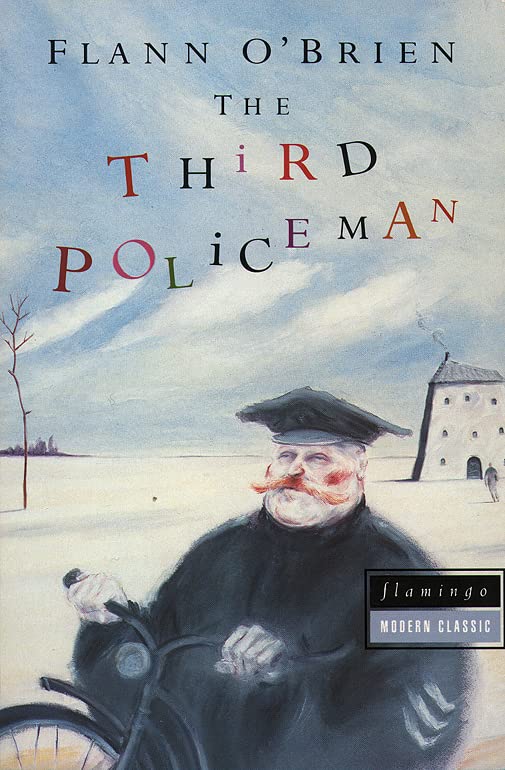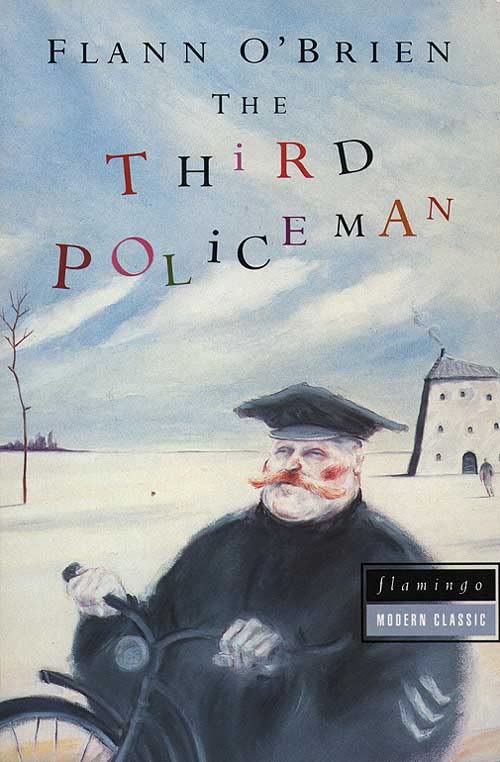Customer Services
Copyright © 2025 Desertcart Holdings Limited
Desert Online General Trading LLC
Dubai, United Arab Emirates



The Third Policeman
K**N
Started off very enthusiastically but ...
But then got a bit too weird for me.
D**N
The meaning of the 3rd policeman
In the 3rd Policeman Flann O'Brien was written (probably unwittingly) a truly profound critique of how as human beings we seek to relate to and understand the world and our place within it. This is not to deny that the book is flawed - in particular because FO'B seeks to mask this profundity within a comic format. Unfortunately the comedy rather than dancing with the profound tends to obscure it. So we laugh lovingly at the surface folly of De Selby whilst not also seeing our own folly and his amazing insights.In outline the 3rd Policeman is a kind of modern Pilgrims Progress for more complex times than those faced by Bunyan's Christian - actually it is more accurately a Pilgrims non-Progress (i) given De Selby's justifiable doubts about progress, journeys, time, and narrative development.The hero / narrator of 3rd Policmen goes, through the course of the book, on an intellectual / spiritual non-journey. His guide is the phollosopher (ii) De Selby, who he has studied extensively.It is difficult to summarise De Selby's approach totally, as he precisely opposes and wishes to defy such systemisation of thinking; however in outline the following are some of his key tenets that then impact on our hero's non-progress.De Selby recognises that human being are planners and constructors. It is precisely this ability to prepare for a future and to proactively shape the world (not simply to respond to it) that has been key to our evolutionary success - humans far far outstrip any other species' abilities to do this. Clearly this has had major survival and dominance advantages for us as a species.However De Selby warns that humans have come to trust and develop these skills beyond their appropriate realm. In particular the human move from concrete to abstract constructions has led to us having a completely distorted and delusional view of the cosmos and our place within it - being a species that is good at building a house does not necessarily mean that we are good at building a philosophy, and we in our arrogance have chosen to forget this. Human beings have made the sponge cake - this is clearly good, and De Selby would concede that we are right to "believe" in sponge cake and accept our relationship to it. However humans have also made Time, the Self and God - this is more problematic, and De Selby would plead with us to de-construct these and to allow air in. This is the meaning of his crucial discussion of the damaging effect of houses and living inside, and the need to construct houses without walls. Our hero comes to understand (at least sub-consciously) that DS is not here talking about houses literally, but about the theories we have come to live in, and that we have allowed these to become our prisons.This does not necessarily mean that what De Selby would see our three (each represented in the novel by a policeman??) most dangerous theoretical structures - Time, the Self and God as not "true" or as not existing, but that we need to realise that they are not sponge cake. [Putting in a personal note at this point re the 3 dangers I would say that clearly Time does not exist (iii), certainly not as constructed by humans, nor does the Self (iv) - as to God I have no useful insights (v)].So what is De Selby saying to his hero and to us? Is he calling upon us to abandon our philosophic / religious / psychological constructs? No - he is no fool, and knows that once out there is no way of putting the genie back in the fridge. But he does want to remind us, in the words of the Buddha that "Life is not over stranger than you imagine, but stranger than you can imagine". Hence he tells us to seek to develop a different relationship with our constructs - to wear them not as a suit of armour, but as a perfume. However a key problem with De Selby as a guide (and it proves to be the downfall of our hero) is that he sets out no intellectual or spiritual practice to help us do this, other than in the Codex. Perhaps this is deliberate - maybe we each have to find our own way of doing this (vi). Of course this in itself becomes contradictory to De Selby's own opposition to individualistic routes to wisdom.I think that briefly summarises my sense of the novel. Even if this does not coincide with other people's within the book group I would ask you to remember the words of Socrates about his own experience of discussion groups "I beg you not to listen to the many who speak to you of wisdom, but to the lone fool who sings of the virtue of ignorance".Thank you, and see you all soon I hope!
J**N
Surreal, creative, frustrating.
This is an extraordinary novel. It's a murder mystery but it's not. It's an adventure story but not in a world we know.Packed with surreal images, two dimensional buildings, that change size, roads that have a sense of preference as to which way they should be travelled. Rooms that are not rooms in buildings that may exist. Talking murder victims that may or may not be dead. The importance of bicycles and how they and people can morph together.If none of the above makes sense, then that's about right. If you are intrigued by the above, then this is for you. Be prepared to be entertained, confused, wrong- footed, baffled and frustrated, especially by the footnotes.Go along for the ride and expect never to forget the images the book conjures up.If you like Douglas Adams, especially the 'Hitchicker books, you will love this.
D**O
You'll never look at bicyicles in the same way...
Reading this masterpiece it becomes immediately obvious where comedy writers such as Terry Pratchett and Robert Rankin, and all their lesser copycats, learnt their craft. It's all here - wild flights of fancy, bewildering and tangenital footnotes that quickly become longer than the chapters themselves, meandering conversations that leave everyone (including the reader) confused, some truly inspired pieces of barmy reverse-logic - and it's all great fun.It begins with a murder by two desperate men somewhere in Ireland, but rapidly goes to all manner of strange places. The book is mainly a satire on the archetypal village police force taken to ludicrous extremes, and O' Brien uses his two monstrous policemen not only to great comic effect, but to expound all manner of strange theories. Some of the ideas are just plain barmy, yet all make an odd sort of sense within the book's own internal sense of logic. O' Brien also manages to shoot the book through with a creeping, brooding menace that you don't even realise is there until the nerve-biting climax begins, an impressive feat given the often outre subject matter.And the bicycles. Was there ever a book or set of characters so obsessed with them? Bikes that are almost human, humans that are almost bike, and the main character's surprisingly touching and sweet love-affair with a female bicycle near the end was astonishingly well-written, considering the barmy subject. And what's weirdest is how it all makes so much sense. For instance - you know how you'll sometimes see a bike in a hallway or kitchen on a stormy, rainy evening? Person A will assume person B put it there, person B assumes person A put it there, and no-one thinks to comment. The truth is that the bike, naturally enough, just decided to come in from the cold and the wet...I don't really think I'm doing a very good job explaining the book, but even that is almost a testament to what Flann O' Brien created - a novel that really has to be read to be appreciated. Buy it on a leap of faith - I did, and soon realised just why it's considered such an important book. You won't find anything else like it.
Trustpilot
3 weeks ago
2 weeks ago